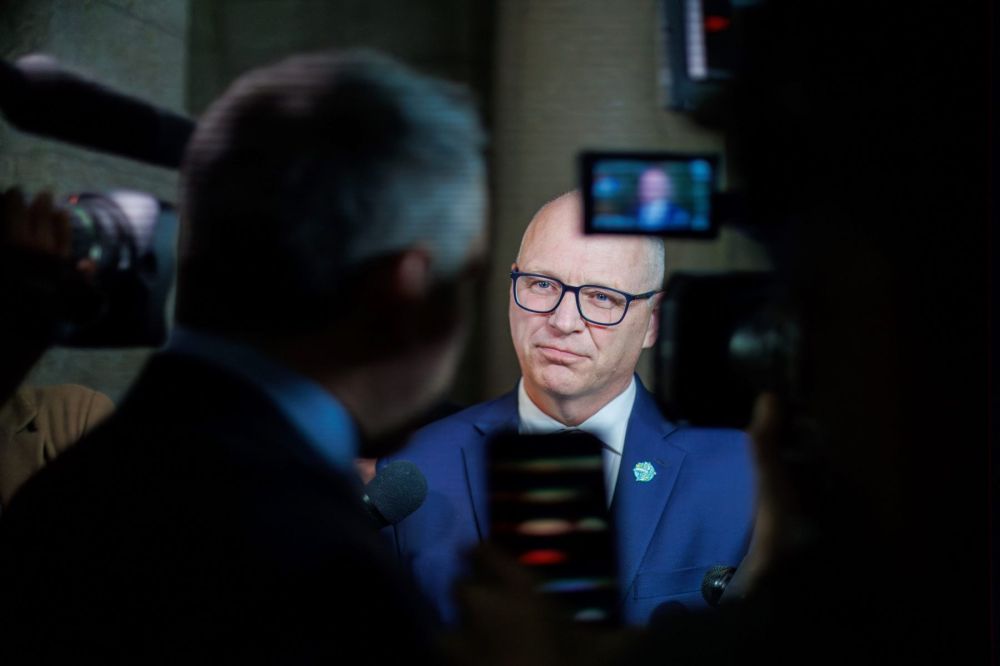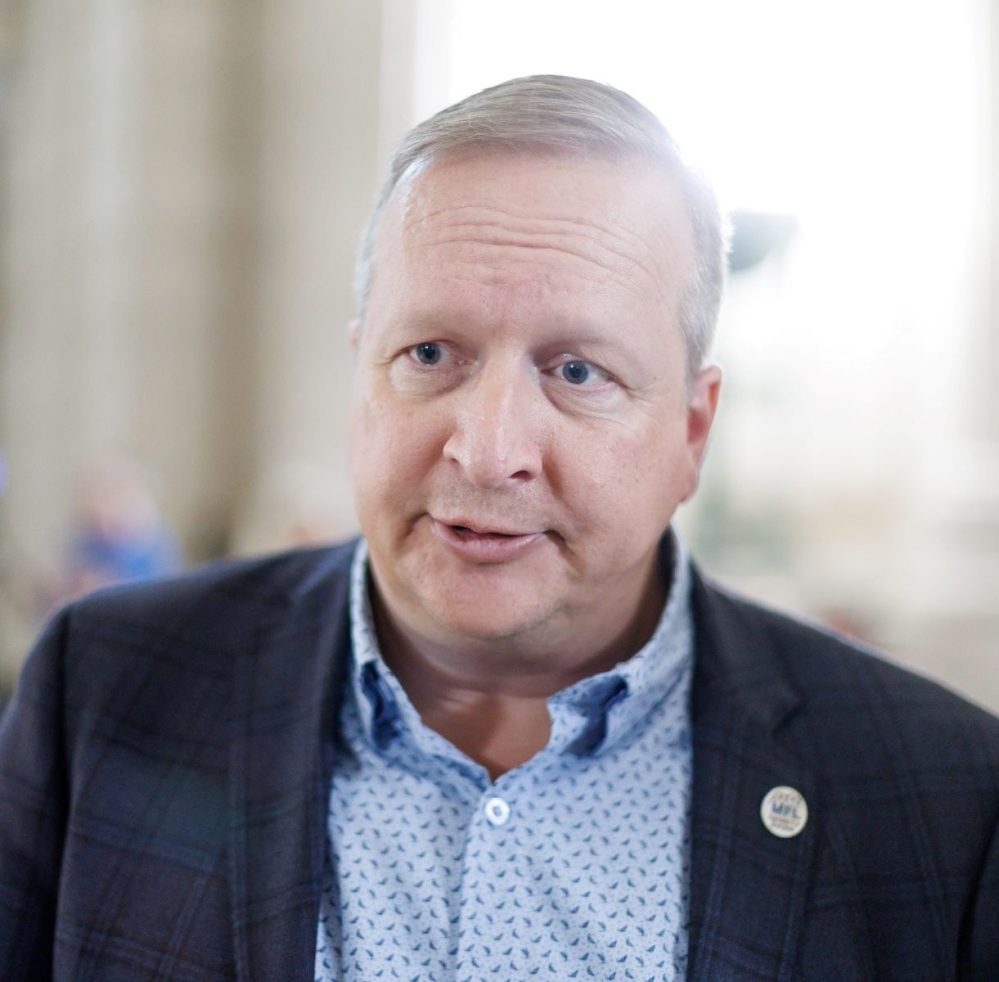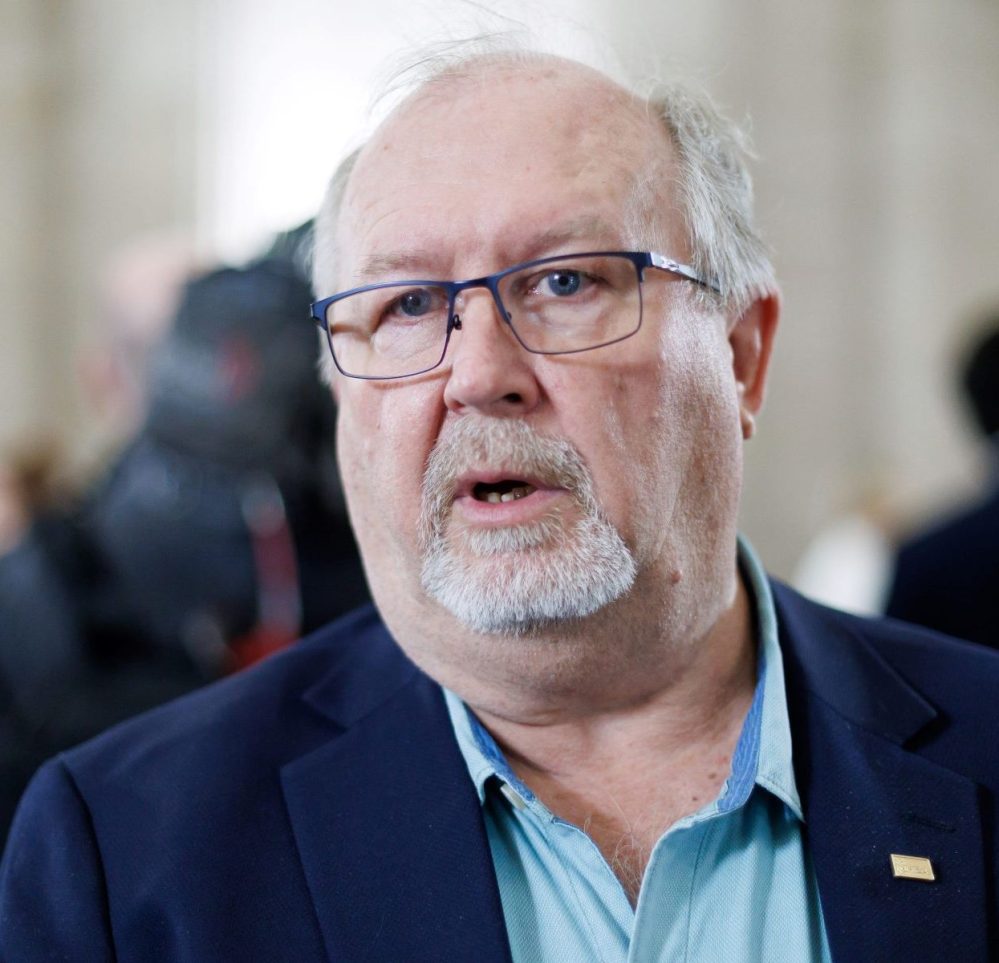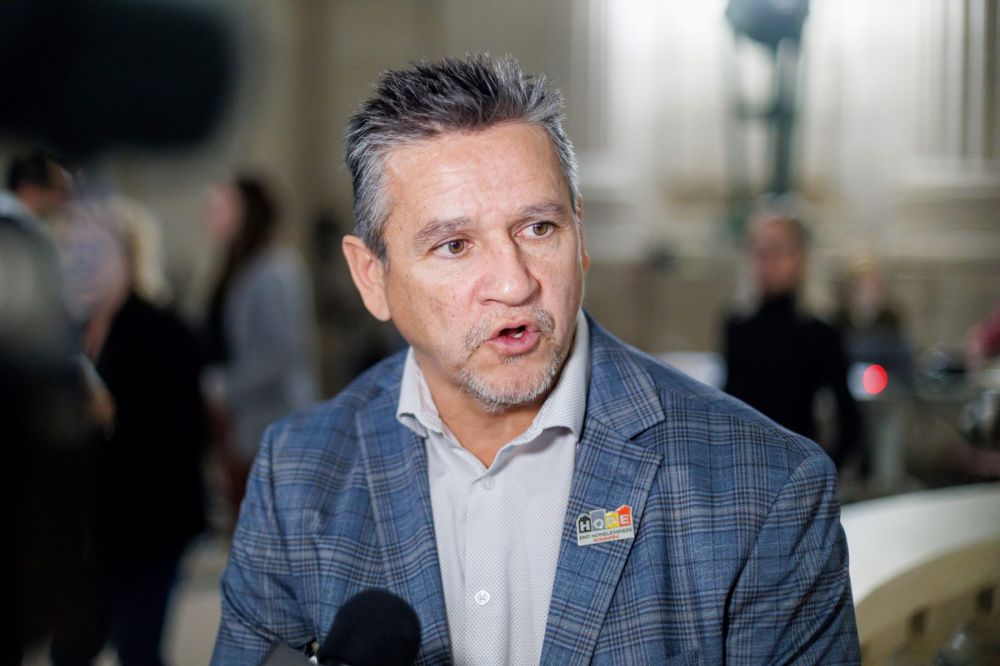Reaction pours in to NDP’s first budget
Advertisement
Read this article for free:
or
Already have an account? Log in here »
To continue reading, please subscribe:
Monthly Digital Subscription
$0 for the first 4 weeks*
- Enjoy unlimited reading on winnipegfreepress.com
- Read the E-Edition, our digital replica newspaper
- Access News Break, our award-winning app
- Play interactive puzzles
*No charge for 4 weeks then price increases to the regular rate of $19.00 plus GST every four weeks. Offer available to new and qualified returning subscribers only. Cancel any time.
Monthly Digital Subscription
$4.75/week*
- Enjoy unlimited reading on winnipegfreepress.com
- Read the E-Edition, our digital replica newspaper
- Access News Break, our award-winning app
- Play interactive puzzles
*Billed as $19 plus GST every four weeks. Cancel any time.
To continue reading, please subscribe:
Add Free Press access to your Brandon Sun subscription for only an additional
$1 for the first 4 weeks*
*Your next subscription payment will increase by $1.00 and you will be charged $16.99 plus GST for four weeks. After four weeks, your payment will increase to $23.99 plus GST every four weeks.
Read unlimited articles for free today:
or
Already have an account? Log in here »
Hey there, time traveller!
This article was published 02/04/2024 (628 days ago), so information in it may no longer be current.
The Kinew government’s first budget was delivered on Tuesday, with an array of new spending and rebates for Manitobans.
The Free Press has compiled reaction to the NDP’s first fiscal plan.
Chuck Davidson, president and CEO of the Manitoba Chambers of Commerce
“I wouldn’t say it’s necessarily business-friendly; I think it’s what we expected from this government. This is what they campaigned on, so they have followed what their campaign promises were going to be: the investments in health care, investments in affordability, we’re seeing a lot of that in the budget.”
Chambers of Commerce CEO and president Chuck Davidson said there is not a lot in the budget that addresses larger issues stemming from inflation pressures — a big issue for businesses is affordability.
“What we like, though, is there’s not additional pressures being put on business as well,” he said.
The budget addresses some of the workforce concerns businesses had, including immigration, but the chamber wants more details on longer-term economic plans, including trade and minerals strategy.
“There’s a bit of a wait-and-see approach that we’re taking on this budget.”
Davidson said the chamber supports the decision to keep personal income tax measures in place but would’ve liked to see some adjustments to Manitoba’s payroll tax.
Longer-term issues of concern include the provincial debt increase, as well as the percentage of provincial revenues that are dependent on the federal government.
Kyle Ross, president of the Manitoba Government and General Employees’ Union
The Manitoba Government and General Employees’ Union is cheering the government’s commitment to hire hundreds more health-care workers this year, particularly 600 health-care aides.
“That’s huge,” MGEU president Kyle Ross said.
“I’ve toured rural Manitoba, Prairie Mountain and those areas, and they’re starving for staff. There’s so much reliance on agencies.”
The government will have to put a lot of effort into filling vacancies in the public sector so there will be enough public servants to fulfil all of these promises, he said.
The union “wholeheartedly supports” the promise to ban replacement workers in the public sector. Overall, this budget is “a good news story for Manitoba,” Ross said.
Winnipeg Mayor Scott Gillingham
MIKE DEAL / FREE PRESS Winnipeg Mayor, Scott Gillingham, talks about the new provincial budget that was announced by the NDP government, Tuesday. 
“The two per cent increase is not quite what we hoped for but I do appreciate that it’s not a freeze, I think that’s important. What is more important to me is the news … we’ll be working with the City of Winnipeg and (Association of Manitoba Municipalities) in the development of a new funding formula for municipalities. That’s very important. We’ve been calling for that, AMM has been calling for it. I campaigned on getting a new funding formula for the city of Winnipeg so we can have long-term predictable funding that’s growth-oriented.”
Kevin Rebeck, president of the Manitoba Federation of Labour
The promise to hire 1,000 health-care workers is exciting, Manitoba Federation of Labour president Kevin Rebeck said.
MIKE DEAL / FREE PRESS Kevin Rebeck, President of the Manitoba Federation of Labour. 
Understaffing is the No. 1 issue for federation members “who are overwhelmed and burning out, and knowing that more staff is coming is going to be quite exciting news for folks, and I think all Manitobans would agree this is a priority issue,” Rebeck said.
The federation was hoping the budget would include a commitment to increase child-care spaces in Manitoba — we’re 20,000 spaces short, he said, and early-childhood educators “are grossly underpaid, often with no or few benefits.” Having funding to support and retain early childhood educators would make childcare more sustainable, he said.
Rebeck said he’d also been hoping this budget would restore the health-and-safety inspector positions the previous government cut, but there was no such commitment. He said he was glad to see investments in infrastructure and trades, and glad that the budget shows the government is taking a “moderate” approach to tax cuts.
Jason Linklater, president of the Manitoba Association of Health Care Professionals
The association is pleased with this budget’s investments to hire and train more allied health professionals, including paramedics, and president Jason Linklater said it will be an “aggressive agenda” to fill those training-program seats.
“There needs to be recruitment and retention incentives developed, and there need to be training programs.”
MIKE DEAL / FREE PRESS Jason Linklater, Manitoba Association of Health Care Professionals. 
The budget included investments in the advanced care paramedics program, including $16.1 million in ongoing funding for emergency ground transport and two ambulances operating in Brandon and Thompson 24-7.
Linklater said he believed the last rural advanced care paramedics course had little to no enrolment. The most important factor in recruitment and retention, he said, will be negotiating a new contract for allied health professionals.
“The biggest indication for us, in terms of intent, is going to be successful contract talks, and they need to be aggressively implementing those recruitment and retention incentives.”
The union is still pushing for a comprehensive Human Resources plan for the 44 specialized professions within its membership.
Chris Lorenc, president of the Manitoba Heavy Construction Association
Chris Lorenc, president of the Manitoba Heavy Construction Association, said he’s “not surprised” by the budget, which focuses on the “social side” of the economy.
MIKE DEAL / FREE PRESS Chris Lorenc, President and CEO of the Manitoba Heavy Construction Association. 
Plans to invest in the Port of Churchill and CentrePort are “good news,” he said.
“One should never be under the illusion that a one-time, first budget is going to address everything… so we remain hopeful.”
Lorenc said he’s glad the premier has struck a blue-ribbon panel on construction, which is mandated to develop criteria for future infrastructure investments.
“We’ll wait to see what happens over the next six, nine months in anticipation of a budget in 2025 that hopefully will more visibly focus on ensuring that we have a healthy economic host.”
Michael Boroditsky, president of Doctors Manitoba
“We’re encouraged… we’re just anxious to see some of the details.”
Doctors Manitoba would’ve liked to see more specifics on team-based care, something the budget document plans to support and expand. How teams-based care is implemented can make a difference to the efficiency of health-care, and it’s something Doctors Manitoba supports.
“We want to be at the table,” when it comes to recruitment and retention. “The best recruiter of physicians is other physicians, and so we want to be part of that. We don’t feel that it can be just left up to bureaucrats or administrative (staff).
Asked about the premier’s promise to issue job offers to every prospective health-care worker graduating from post-secondary school, he said medical grads within the province make up the greatest proportion of new doctors in Manitoba, so the province needs to make them a priority along with international medical-school grads.
“Recruitment is essential from outside the province, and we can’t do it only inside, but we’ve got to keep supporting the base.”
Chris Adams, University of Manitoba political scientist
“I would say it’s a typical NDP budget,” with more support for middle- and low-income earners, including more support for renters than for homeowners.
Extending $10 a day childcare and expanding provincial child nutrition programs are expected to make a big impact, and the NDP’s plans for health care “will be affecting everybody.”
“I would say there’s a lot in this budget that will benefit the average person in Manitoba, but I would say that if I were a business person, I might take stock of this budget (and find fewer business-focused promises than a PC budget.)”
Gage Haubrich, Prairie director of the Canadian Taxpayers Federation
MIKE DEAL / FREE PRESS Gage Haubrich, Prairie Director with the Canadian Taxpayers Federation. 
“It was kind of one step forward and two steps back. We were grateful to see that the government decided to extend the gas-tax cut an additional three months. We would have liked to have seen that tax cut made permanent, but any amount of money going back in the taxpayer’s pocket is better to help them make ends meet.
It was really disappointing to see such a large deficit this year. The government talks a lot about their commitment to fiscal responsibility. We didn’t see that today. They do have a plan where they want to balance the budget in four years but it’s going to be on a razor’s edge at 18 million dollars. A strong wind could make 18 million be spent by the government. We’re hoping to see a plan that has a bigger surplus and much more of a commitment to get debt down and start reducing those interest payments.”
Molly McCracken, Manitoba director of the Canadian Centre for Policy Alternatives
“By continuing the gas-tax cut, this government is continuing the neoliberal playbook on the fiscal side. Why is Manitoba paying the cost for Imperial Oil’s unplanned maintenance on this pipeline when we need that revenue to get off of fossil fuels that we’re so reliant on.
”We did call for a reversal of the personal income tax cuts of the property tax cuts and that has not happened though we do acknowledge that there are some changes around the edges there in terms of a change to the basic personal exemption for the upper income earners and a removal of the property taxes on commercial properties. But the fact of the matter is this budget is reliant on federal equalization transfers and that makes Manitoba vulnerable to any more economic shocks or change in federal government.”
Kam Blight, president of the Association of Manitoba Municipalities
“It’s a good start. There’s certainly more work that needs to be done. We are pleased to see that there’s no funding freeze in place for the operating funding basket and strategic infrastructure funding for municipalities. There’s a two per cent increase that’s been promised for this year which is nice to see, of course, but it does fall short of inflation and it’s going to create challenges for municipalities going forward. But we are also very pleased to see that in the budget, there is wording there that states that the province will sit down and discuss a future funding model for municipalities that will be long-term and predictable… We are concerned though that the public safety basket saw zero increase for municipalities.
“Touring across the province of Manitoba and visiting all 137 municipalities that is one topic that comes up at every single meeting and that has not been addressed in this budget. This government came across saying that they’re going to be tough on crime and we’re concerned that they’re lacking here.”
Darlene Jackson, president of the Manitoba Nurses Union
MIKE DEAL / FREE PRESS FILES Manitoba Nurses Union president Darlene Jackson. 
In a statement, Manitoba Nurses Union president Darlene Jackson said capital investments are welcome, but they need to be followed by investments in human resources.
“There remains plenty of work to do, we know it will take time, but we also hear from our members that patience is wearing thin,” said Jackson. “Government and employers need to be fixated on implementing approaches that will retain nurses in our system. Without this, inadequate staffing and burnout will continue to be major issues.”
Jerry Daniels, grand chief, Southern Chiefs’ Organization
In a statement, the Southern Chiefs’ Organization said it is pleased with many aspects of the budget, including investments in harm reduction, chronic homelessness, and a commitment to the landfill search.
“It is good to see investments in health care with a commitment to hire 1,000 health care workers along with doubling the prenatal benefit to $162.52, which will benefit many First Nations people. Also, we applaud the increased funding by $500,000 to the Manitoba diabetes action plan to improve diabetes prevention, detection, management, and surveillance in Manitoba. It is my hope that these moves will help to close the 11-year, and growing, gap in life expectancy between First Nation and non-First Nation people in our province.”
Kirsten Bernas, chair of the provincial working group of the Right to Housing Coalition
”We cannot expect to make progress against poverty or homelessness without significant and long-term investments in rent-geared-to-income housing. We have yet to see a government in this province that either cares enough or is brave enough to make this a priority. We hoped this new government would finally do what it takes to address housing insecurity and homelessness in our communities, but unfortunately this budget falls short.”
Jason Whitford, CEO of End Homelessness Winnipeg
MIKE DEAL / FREE PRESS 
“Overall, it’s promising. It’s a step in the right direction. In order for it to be impactful it needs to be (for years) and gradually increasing until we can put an end to chronic homeless and ensure that we have an adequate supply of housing out there to put roofs over people’s heads and help them begin their healing journey… The injection of capital fund and the revitalization of the social housing is what we desperately need, what we’ve been advocating for the past couple of years or even more, but we need those units to be back online and we need further investment in more social housing units.”
—Katrina Clarke, Katie May

Katie May is a multimedia producer for the Free Press.

Our newsroom depends on a growing audience of readers to power our journalism. If you are not a paid reader, please consider becoming a subscriber.
Our newsroom depends on its audience of readers to power our journalism. Thank you for your support.
History
Updated on Tuesday, April 2, 2024 9:10 PM CDT: adds intro graf
Updated on Wednesday, April 3, 2024 12:37 PM CDT: Corrects typos
Updated on Wednesday, April 3, 2024 2:54 PM CDT: Changes photo
Updated on Wednesday, April 3, 2024 3:27 PM CDT: Adds more reactions and photo









